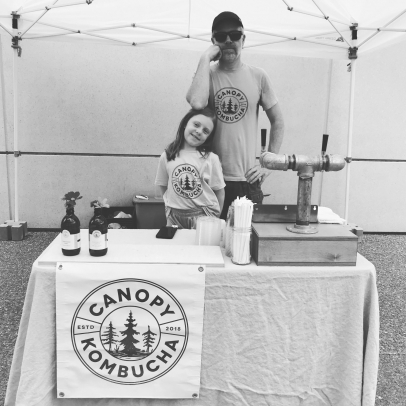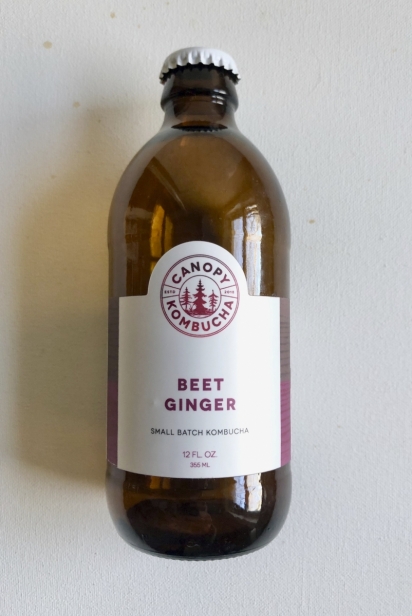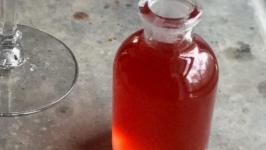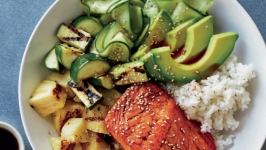Kombucha? Youbetcha.
“I make some really pretty compost.” Derek makes this unexpected remark while showing me around his fermenting and bottling location in LaVergne. What happens to the byproducts of a craft beverage like Canopy Kombucha isn’t exactly something one thinks about, but it makes total sense. Between the tea leaves and remnants of the delicious combinations of flavors he uses such as cucumber lemon and turmeric carrot, there would be a good amount of compostable scrap and it should go somewhere to further help the local community.
But what brought Derek, a self-proclaimed “fermentation perfectionist,” to this quaint space just southeast of Nashville, hovering over large-mouth glass containers? A simple nudge from a friend. “I was making sourdough at home [at the time] and so it wasn’t much of a stretch. [He] gave me the starter culture [that I still use today].”
Though he enjoyed his home brew, the cost/benefit ratio wasn’t exactly even. “It’s a lot of work (about a 2-3 week process) to get like 6 bottles,” he says with a chuckle. “And then my kids would drink it up and it’d be gone in a couple days.” When the opportunity to start something new from the ground up appeared, he took it. “It looked like a fun thing to do in a town where people appreciate quality and are really receptive,” he says.
To craft his kombucha, Derek starts with a blend of black and green jasmine tea, to which he adds sugar, a bit of finished kombucha (to acidify the new brew and ensure it starts at a safe level), and a SCOBY (Symbiotic Culture Of Bacteria and Yeast). A SCOBY is a live-active culture, similar to a sourdough starter, and a natural byproduct of the brewing process that needs oxygen to feed it. “It occurs because there’s natural yeast in the air,” explains Derek. “Someone must have left out some sweet tea some thousands of years ago,” he says, discovering what we know to be the SCOBY today. The SCOBY breaks down the sugar in the tea and releases probiotic bacteria. When it ferments, it carbonates, creating the vinegar-esque, fizzy taste it’s known for. Derek finishes his brews by adding flavorings and/or juices at the end before straining and bottling.
While devoted fans declare kombucha presents a wide variety of benefits, Derek keeps his feet on the ground about it. “I find myself walking people back a bit on the health claims. And [it seems] like there’s very little grey area. People really love it or really don’t. [But] what I’m doing is simply creating a really tasty beverage that’s better for you than other beverages.”
Where to buy Canopy Kombucha:
Produce Place, Fido, Green Door Gourmet, Fenwick’s 300, Farm City – Nashville Farmer’s Market, Oh My Chives, The Loading Dock - Wedgewood Houston, Green Fleet Bike Shop, Herban market, Bongo Java East Café/ Game Point, Tower Deli, Sip Café, Phat Bites, Demeter’s common
Benefits
It’s pronounced kom-booch-ah. And you’ve, no doubt, seen it everywhere from health food stores to farmer’s markets; in an office, a college kid’s hand, or even a gas station. It’s had quite the rise in popularity over the last 5 years, becoming a 15-million-dollar industry and such a mainstream staple that it isn’t surprising to learn of your neighbor’s batch in their basement. This is predominantly due to it being a probiotic-rich beverage, which is a friend to the health of your gut (known as the “good” or “helpful” bacteria), and therefore a strengthener of your immune system.
History
Kombucha isn’t a new beverage -- it’s been around for thousands of years. Originating in Northeast China around 220 B.C., the fermented tea was valued for it’s believed healing properties. The drink is supposedly named after Dr. Kombu, the Korean physicist who first brought it to Emperor Inkyo in Japan as a curative. Though there was a patch of unavailability due to WWII causing shortages of tea and sugar, kombucha rose to popularity in the 60s and 70s, after a study in Switzerland compared its benefits to those of yogurt.









